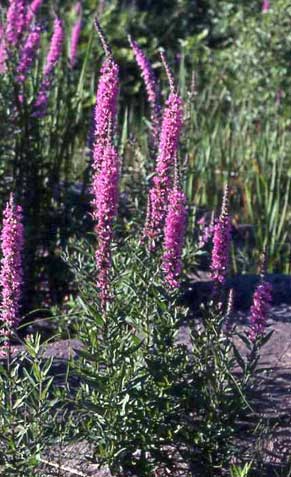Got any Norway maple, Japanese barberry or honeysuckle, winged euonymus, autumn olive, Japanese honeysuckle, or multiflora rose in your yard? You’re harboring aliens! These are all considered invasive species – exotic plants not native to our area that were introduced for ornamental purposes but have gotten out of control.
 |
One purple loosestrife plant produces as many as 2.5 million seeds a year. |
Invasive plants cause serious ecological harm, taking over whole habitats and choking out native species. While kayaking down the Quinebaug River last week, I was saddened to see Oriental bittersweet smothering hundreds of trees that were surrounded by purple loosestrife. Nationwide, three million acres are lost each year to these aliens. About half of the species on the Federal Endangered Species List are there in part because of invasive species.
As of October 2004, the sale and import or export of a number of invasive plants is prohibited in Connecticut. After that time, anyone involved in the invasive-plant black market faces fines of up to $100 per plant.
If you already have invasive species on your property, help control further spread by taking immediate action. For help in determining if you have an invasive, call your local UConn Cooperative Extension Center at 774-9600 (Brooklyn). The type of action required depends on the species, and the size and nature of the infestation. For example, light infestations of bush honeysuckle can be cleared with a shovel or hoe, as long as the entire root is removed. More severe infestations may required repeated cuttings, burning, or herbicide application.
MORE INFORMATION
For more information on what you can do to help stop the spread of invasive plants, see the Woodstock Conservation Commission webpage on Invasive Plants. |

